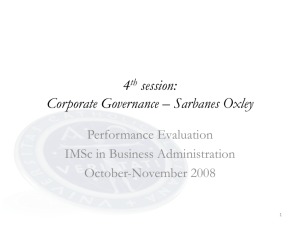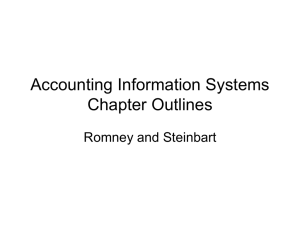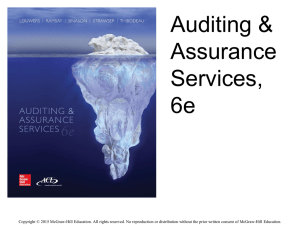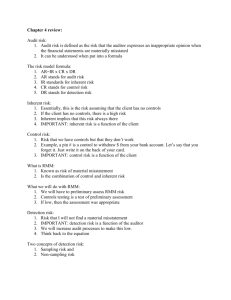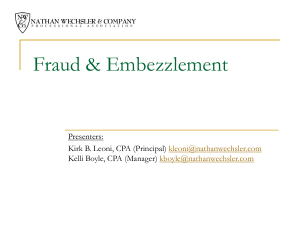Fraud detection – an area of increasing auditor responsibility? The
advertisement
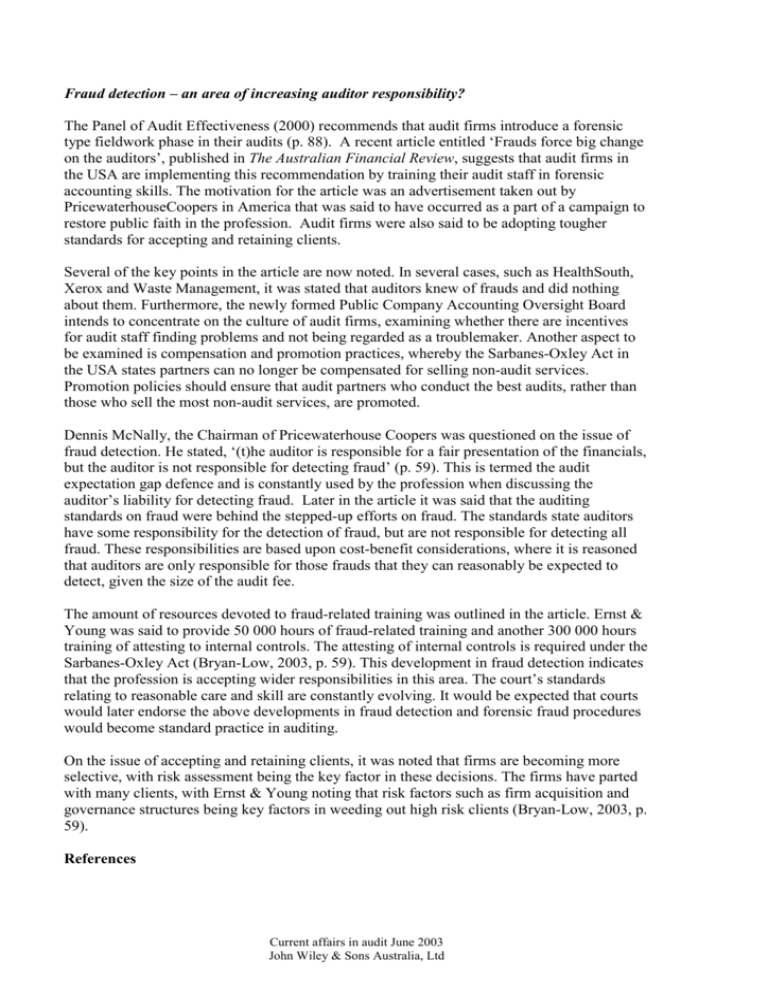
Fraud detection – an area of increasing auditor responsibility? The Panel of Audit Effectiveness (2000) recommends that audit firms introduce a forensic type fieldwork phase in their audits (p. 88). A recent article entitled ‘Frauds force big change on the auditors’, published in The Australian Financial Review, suggests that audit firms in the USA are implementing this recommendation by training their audit staff in forensic accounting skills. The motivation for the article was an advertisement taken out by PricewaterhouseCoopers in America that was said to have occurred as a part of a campaign to restore public faith in the profession. Audit firms were also said to be adopting tougher standards for accepting and retaining clients. Several of the key points in the article are now noted. In several cases, such as HealthSouth, Xerox and Waste Management, it was stated that auditors knew of frauds and did nothing about them. Furthermore, the newly formed Public Company Accounting Oversight Board intends to concentrate on the culture of audit firms, examining whether there are incentives for audit staff finding problems and not being regarded as a troublemaker. Another aspect to be examined is compensation and promotion practices, whereby the Sarbanes-Oxley Act in the USA states partners can no longer be compensated for selling non-audit services. Promotion policies should ensure that audit partners who conduct the best audits, rather than those who sell the most non-audit services, are promoted. Dennis McNally, the Chairman of Pricewaterhouse Coopers was questioned on the issue of fraud detection. He stated, ‘(t)he auditor is responsible for a fair presentation of the financials, but the auditor is not responsible for detecting fraud’ (p. 59). This is termed the audit expectation gap defence and is constantly used by the profession when discussing the auditor’s liability for detecting fraud. Later in the article it was said that the auditing standards on fraud were behind the stepped-up efforts on fraud. The standards state auditors have some responsibility for the detection of fraud, but are not responsible for detecting all fraud. These responsibilities are based upon cost-benefit considerations, where it is reasoned that auditors are only responsible for those frauds that they can reasonably be expected to detect, given the size of the audit fee. The amount of resources devoted to fraud-related training was outlined in the article. Ernst & Young was said to provide 50 000 hours of fraud-related training and another 300 000 hours training of attesting to internal controls. The attesting of internal controls is required under the Sarbanes-Oxley Act (Bryan-Low, 2003, p. 59). This development in fraud detection indicates that the profession is accepting wider responsibilities in this area. The court’s standards relating to reasonable care and skill are constantly evolving. It would be expected that courts would later endorse the above developments in fraud detection and forensic fraud procedures would become standard practice in auditing. On the issue of accepting and retaining clients, it was noted that firms are becoming more selective, with risk assessment being the key factor in these decisions. The firms have parted with many clients, with Ernst & Young noting that risk factors such as firm acquisition and governance structures being key factors in weeding out high risk clients (Bryan-Low, 2003, p. 59). References Current affairs in audit June 2003 John Wiley & Sons Australia, Ltd Bryan-Low Cassell, 2003, ‘Fraud forces big changes on auditors’, The Australian Financial Review, 13 June 2003, p. 59. Fox Catherine, 2003, ‘Change at office puts ethics at risk’, The Australian Financial Review, 17 June, p. 59. Public Oversight Board, 2000, The Panel of Audit Effectiveness: Report and Recommendations, www.pobauditpanel.org Current affairs in audit June 2003 John Wiley & Sons Australia, Ltd




